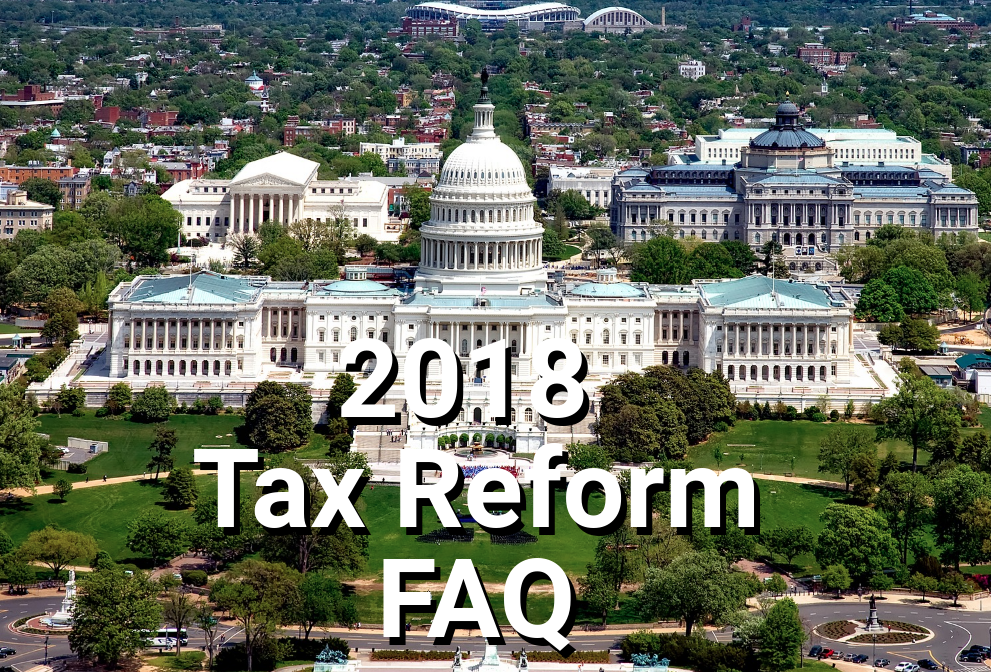Tax reform is one of the most important topics in real estate, finances, and personal savings. While the exact effects of the bill have yet to be seen, there are a few things we’d like to help clarify for the upcoming tax changes.
Specifically, we’d like to focus on how the changes will affect property taxes, as well as buying and selling a home.
Note: San Diego Purchase Loans is NOT a tax expert. This is a general information article and should not be considered tax advice in any way. Never make any financial decisions before talking with a qualified tax expert.
2018 Tax Reform: FAQ From Homeowners
What is the effective date for 2018 tax reform?
For individuals, the tax reform will go into effect on January 1st, 2018. This means that income earned on December 31st, 2017 is subject to the old tax laws, but money earned on January 1st is subject to the new laws. However, the results of the tax bill will not actually be noticed until you file taxes the following year, when you pay on the money you earned for 2018. In April of 2018, you will pay taxes for 2017 under the old system. In April of 2019, you will see the results of the new tax code.
However, if you work a typical job that has taxes withheld from your paycheck, you will likely see a change in your income tax starting in February 2018. For example, if you are paid roughly $2,000 every other week, you’ll likely have a boost of about $70 to $80 in your checks.
How does the tax reform affect my mortgage interest deduction?
The new tax bill that will take affect allows taxpayers with existing mortgages to continue to deduct interest on a total of $1 million in mortgage debt. So if you have a mortgage currently totaling $1 million dollars, you can make a deduction on the added interest. Under the new law, people with who already have these mortgages can continue to deduct the interest from the $1 million.
But new home buyers will have a smaller deduction…
For new buyers, the $1 million limit drops to $750,000. Anyone who purchases a home from now on will only be able to make deductions on interest of $750,000. And you cannot take advantage the period between passing the law and New Year’s Day, as the law states that the deduction restriction takes effect on Dec. 15th, 2017.
What about state and local property taxes? Is there still a deduction?
A lot has been said about state and local taxes, but in effect the change is quite simple: there is still a deduction for state and local taxes, but you can only make the deduction up to $10,000. This seems to be the one component that creates differences in high-tax vs. low-tax areas. Essentially, if you live in a high-tax region and pay more that $10,000 in state and local taxes, you’ll only be able to make a deduction of the first $10,000. By eliminating the deduction, this could, in a round about way, create a higher tax burden for people in certain areas.
Will paying before the December 31st 2017 help at all?
Possibly. Because of the way the bill is structured, you may be able to gain a tax benefit from filing before Dec 31st 2017. However, this date is approaching fast so if you need to act right away.
Because the new tax law does not take effect until 2018, if you pay your property taxes on time you may be able to save by using the deductions currently available. These deductions will disappear if you file, as most people do, in April.
For more information on early filing, see our article “The Advantages of Early Payment on 2018 Property Taxes.”
How are capital gains from homeownership treated under the new tax bill?

Under the new rules, you might want to consider staying in your house for a longer period. Under the old rules, when you sell your home you could exclude the first $250,000, or $500,000 if filing jointly, from your capital gains taxes. To take advantage of this tax deduction, you had to live in the home for two of the previous five years. However, the new tax bill is changing that requirement to five of the last eight years.
So if you are thinking about selling the home in the near future but have only lived there for a couple of years, you may owe more taxes if you move soon. There are potential hardship waivers to this tax, so be sure to consult a tax expert to learn all the details.
What are the Biggest Changes for Homeowners and Would-Be Buyers?
Probably the biggest change to the current tax code is the adjustment in federal tax rates across all tax brackets. According to TaxFoundation.org, the income limits for all tax brackets and all filers will be adjusted for inflation and will change slightly. For most people in the United States, the biggest change is likely the reduction in federal taxes. Starting in 2018 (and paid in 2019), the top marginal tax rate of 39.6% will be in place for tax payers with a taxable income of $426,700 or more. For married couples, the total is $480,0050 or more.
Is there a Benefit to Refinancing Now to Avoid the Changes?
Unfortunately, there does not appear to be any specific advantage to refinancing because the law states that only mortgages purchased before December 15th are eligible for the full deduction on mortgage interest up to $1 million. So even if you get a new mortgage before 2018, you will only be able to deduct interest on the first $750,000.
Guiding You Through the Mortgage Process
While San Diego Purchase Loans is not a tax expert, we can help you through the complex mortgage process. With a common-sense approach to underwriting, we can increase your chances of approval!


